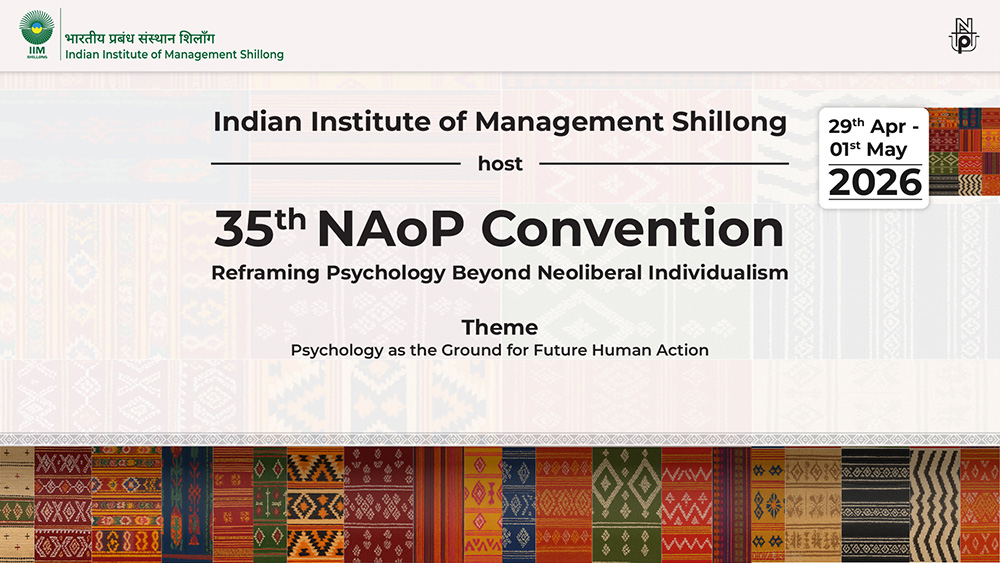
Theme: Reframing Psychology Beyond Neoliberal Individualism
(29th April – 1st May, 2026 )
“Sarve bhavantu sukhinah, sarve santu niraamayaah”
Ancient Indian invocation envisions a world where all beings are happy and free of illness. It is part of the universal peace prayer (shanti mantra) often recited, wishing well-being for all beings. Such traditions have long celebrated compassion and collective well-being as core ethical ideals. Narsinh Mehta’s bhajan, which Gandhi ji sang daily “Vaishnav jana to taine kahiye je peer parayi jaane re” exhorts us to recognize and share in the suffering of others. Yet Psychology, while acknowledging these roots, has often neglected to translate such philosophical ideals into mainstream psychological discourse and practice. While Western models of care and compassion have provided valuable insights, they also risk marginalizing or misrepresenting lived experiences in societies where care is inherently collective, compassion is infused with spirituality, and community is the very ground of selfhood. Increasingly, scholars recognize that the monocultural assumptions of mainstream psychology, what has also been described as cognitive imperialism, cannot adequately capture the diversity of human life. Indigenous psychologies across Asia, Africa, Latin America, and First Nations traditions remind us that care, compassion, and community are not merely psychological constructs, but are embodied as cultural, moral, and spiritual practices. Western psychologists, too, have conceded that cognitive styles differ across civilizations. Pioneering works by Daniel Kahneman and Richard Nisbett, among others, have shown that people in the East often think differently compared to those in the West – embracing holistic, relational, and dialectical reasoning rather than purely analytical or binary logic. These findings echo what Indigenous traditions have long held: that human flourishing arises from interdependence, relational harmony, and compassion. At a time when AI-driven systems risk encoding and amplifying Western norms of human behaviour, the urgency of this discourse deepens. The challenge before us is profound:
The proposed conference aims to serve as a platform for Reimagining Psychology in a way that honours both universals and particulars – where Western insights meet indigenous wisdom, and where the values of care, compassion, and community are reaffirmed as central to human survival and flourishing. Relevance of reimagining psychology goes beyond academia. It lays the very ground upon which future societies, communities, organizations, and nations can be built. A psychology infused with care, compassion, and community creates the foundation for management and governance that are not merely transactional but transformational. In this sense, psychology does not remain a discipline confined to laboratories or clinics, it becomes the scaffolding of all institutions. A plural, compassionate psychology can therefore inspire a new generation of leaders, managers, and policymakers who will shape more humane and sustainable futures.
To be announced shortly
We invite scholars, researchers, practitioners across all domains to contribute papers, panel discussions, symposiums and workshops addressing these themes. Submissions may include theoretical papers, empirical research, case studies, or reflective essays that explore the intersections of care, compassion, community and organizations across diverse cultural and disciplinary perspectives.
Congress welcomes state-of-the-art papers in all areas of psychology, both basic and applied contributions are invited on any contemporary relevant piece of research.
| Abstract Submission Open (Paper/Poster/Symposium) | 1st October 2025 |
| Abstract Submission Close (Paper/Poster/Symposium) | 30th December, 2025 15th January, 2026 |
| Communication of Abstract Acceptance (Paper/Poster/Symposium) | 31st January, 2026 15th February 2026 |
| Communication of Paper Acceptance (Paper/Poster/Symposium) | |
| Pre-Conference Workshops | 28thApril 2026 |
| Conference Dates | 29thApril 2026 – 1stMay 2026 |
Papers will be double-blind reviewed
Rohit Dwivedi,
Professor Organizational Behaviour & Human Resources,
IIM Shillong
Contact: NAoP 2026 Convention Secretariat,
Indian Institute of Management Shillong,
Umsawli, Shillong Meghalaya 793018 India
Email: naop2026@iimshillong.ac.in
About IIM Shillong
IIM Shillong, the seventh IIM in India, has been set up with a vision to become an internationally recognized Management Institute with a Global outlook grounded in Indian values. From its inception, it has been constantly working towards a lofty mission to generate and disseminate knowledge in all aspects of management education with a focus on Sustainability and building innovative leadership.
Travelling to Shillong
Surrounded by verdant hills, Shillong offers a beautiful panoramic view of the graceful scenic countryside. Shillong can be reached by taxi from Guwahati airport/railway station, which is about120 km away. Guwahati airport is well connected to many major cities in India including Bangalore, Chennai, Delhi, Mumbai, and Kolkata. Helicopter services are also available between Guwahati and Shillong. Shillong is connected to Assam, Manipur, Tripura, West Bengal and New Delhi through direct flights.